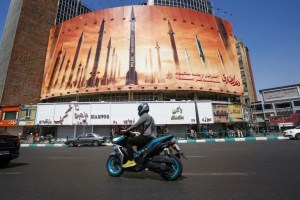The halls of the UN are a habitual stage for empty gestures and vaporous rhetoric, but last Friday’s Security Council vote was a dangerous theater of the absurd — and one in which two of the United States’s allies played ignominious supporting roles.
The Council not only rejected the Trump administration’s proposal to extend Resolution 2231, which restricts conventional arms sales to the rogue regime in Iran. Britain and France, two American allies, abstained.
Why are Boris Johnson and Emmanuel Macron signaling that the pressure is off, the coast is clear, and the mullahs are free to arm themselves with the kind of advanced Chinese and Russian weaponry that would alter the balance of power in Asia and the Middle East — an alteration that would come at the expense of the European powers as well as the United States?
When I spoke with Secretary of State Mike Pompeo on Wednesday afternoon, he was preparing to go once more unto the diplomatic breach on Thursday, to again request the extension of Resolution 2231. He sounded determined: ‘The whole world has signed up for UN Security Council Resolution 2231, and I have no reason to expect that the whole world won’t honor their commitments to the United Nations.’
Pompeo also sounded candidly disappointed with ‘freedom-loving’ Britain in particular: ‘You know, I regret it…we need nations to step up and do the right thing, whether that’s the United Kingdom or the French, the Germans, or others.’
The problem is not principled opposition, but a lack of conviction. Friendly governments, Pompeo says, are failing to match their actions to their principles and interests: ‘Many nations tell me privately that they understand the necessity of the arms embargo continuing to be extended.’
We can presume these diplomatic double-speakers also understand the necessity of reviving economies hit by the COVID-19 pandemic. But there may be other calculations at work here. There is the frivolously short-term view that puts export sales ahead of security. There is the frivolously long-term view that assumes that, as in the Cold War, the Americans will guarantee Europe’s security. There is the perennially frivolous French habit of creating leverage in international affairs by going against les Americains on principle, and the frivolous British habit of standing for principle but selling out the US for favors that the EU never quite delivers.
These assumptions are wrong, and cumulatively dangerous to the international order. The Cold War ended 30 years ago. To its credit, the Trump administration has succeeded in forcing Nato members, notably Germany, the richest country in the EU, to honor their commitments to defense spending. Short-term profits of the kind that British, French and German companies have pursued in Iran come with a high price in regional and global security.
The British literally cannot afford to insult their closest ally. Boris Johnson has promised his voters that the US will offer a free-trade deal to soften the economic pains of Brexit. But on Iran as on Huawei, Johnson has set Britain against the Trump administration.
Yet both Britain and France, and Germany too, purport to be responsible global players. The German foreign ministry has briefed German media that it has proposed a compromise resolution. If there is one, Pompeo has yet to see it: ‘I’m not familiar with there being a compromise that’s been presented.’
It’s hard not to conclude that the Europeans would rather take their chances with the mullahs than take a stand with the Americans. We know what that means. In 2015, the Obama administration gave the Iranian regime a free hand with the Joint Comprehensive Plan of Action, the ‘Iran deal’. The Iranian regime used cash from the Obama administration to fund its imperial campaigns of terrorism, and it continued to develop ballistic missiles and thwart the inspections program.
John Kerry, who staked his reputation and the security of the West on that deal, appeared at the Democratic National Convention on Tuesday night and claimed that the Obama administration had ‘eliminated the threat of an Iran with a nuclear weapon’.
‘The JCPOA didn’t ban Iran from having a nuclear weapon,’ Pompeo counters. ‘Indeed, it created a clear, if a bit delayed, pathway for Iran to return to its nuclear program. And so his statement that it prevented them from getting nuclear weapons was just totally false…I guess Secretary Kerry is just living in a fantasy land.’
In recent days, the Obama administration’s apologists have been pushing a related fantasy, that the Israel-UAE rapprochement isn’t a major breakthrough. It is, of course, but that reality must be denied because it exposes the delusions of the Obama-era policy of building up Iran.
[special_offer]
‘You can see with the agreement we reached with the Emiratis, that the Middle East is more stable today as a result of the decisions that President Trump has made,’ Pompeo points out, ‘whether it was moving our embassy in Jerusalem, or our efforts to counter Isis, or our support for the sanctions.’
The Europeans used to complain about the overbearing Americans. Now they complain that the Americans aren’t overbearing enough: that the US is rebalancing its forces instead of defending Europe’s frontiers. Except, of course, when the US is being overbearing by reminding the Europeans that Iran and the Middle East is on their doorstep, and that Israeli-Arab rapprochement is better than Iranian militancy. It is in the European interest to act with the United States at the UN. It is also, as Pompeo argues, in the interest of global stability.
‘They need to step up and acknowledge the threat that Iran poses to the world and the fact that they should not be in receipt of Chinese tanks or Russian air defense systems.’


















